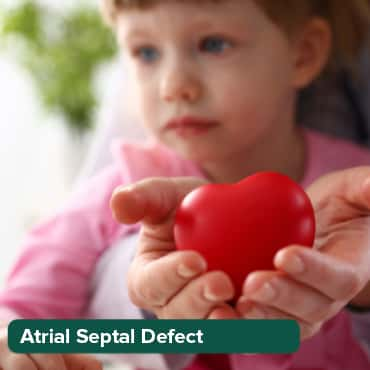
Hospital
Inclusions & Exclusions
Inclusions
Room charges (for the specified period)
Consumables, Surgery & Surgeon's fees
O.T. charges
Anesthesia charges
Routine medicines for the number of days as per the package offered. If any extra medicines are
required which are not routinely used then it would be charged as per the actual
Food and Beverages for the patient only as per the diet recommendation.
Exclusions
All expenses for stay beyond the package period
Professional charges of other consultants
Any other additional procedure
Use of special drugs/ consumables
Blood products
CT/MRI or complex lab investigation
Cost of high-value consumables valves/conduits/grafts will be charged extra (unless otherwise
specified) as per applicable rates over and above package cost
About The Treatment
ASD (Atrial Septal Defect) closure is a medical procedure used to repair a hole in the atrial septum, the wall that separates the upper chambers (atria) of the heart. An ASD allows abnormal blood flow between these chambers, which can lead to various cardiovascular problems if not treated. Here’s a brief description of the ASD closure procedure:
Understanding ASD Closure
- Purpose: The procedure aims to close the defect in the atrial septum to prevent oxygen-rich and oxygen-poor blood from mixing. This helps normalize the blood flow through the heart and lungs, reducing the risk of heart failure, atrial arrhythmias, and pulmonary hypertension.
Types of ASD Closure:
Surgical Closure: Traditional method involving open-heart surgery where the defect is closed using sutures or a synthetic patch. This approach is typically reserved for larger defects or when additional cardiac anomalies need correction.
Percutaneous Closure (Catheter-based): A less invasive method using a catheter inserted through a vein in the groin. A device, often called an occluder, is positioned across the ASD to seal it. Over time, heart tissue grows over the device, permanently sealing the hole.
Procedure Details:
- The choice between surgical and percutaneous closure depends on the ASD's size, location, and the patient’s overall health. The percutaneous approach is generally preferred due to its minimally invasive nature, quicker recovery, and excellent outcomes for suitable candidates.
Recovery:
- Recovery from percutaneous ASD closure typically involves a short hospital stay, usually overnight, with most patients returning to normal activities within a few days. Surgical closure recovery is longer, requiring several weeks for full recovery.
Benefits of ASD Closure:
- Closing an ASD can greatly improve quality of life and cardiac function, reduce the risk of stroke, and prevent the progression of pulmonary hypertension.
